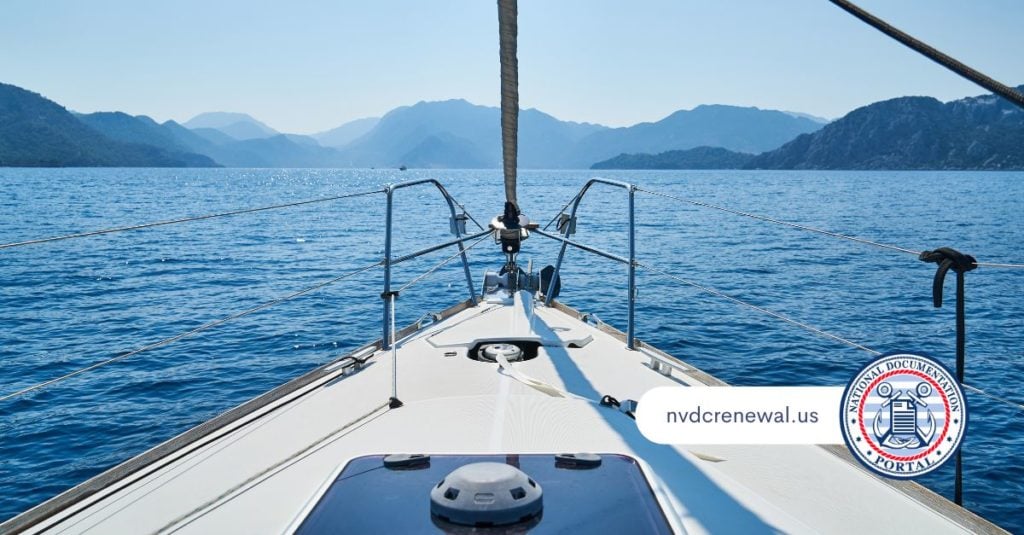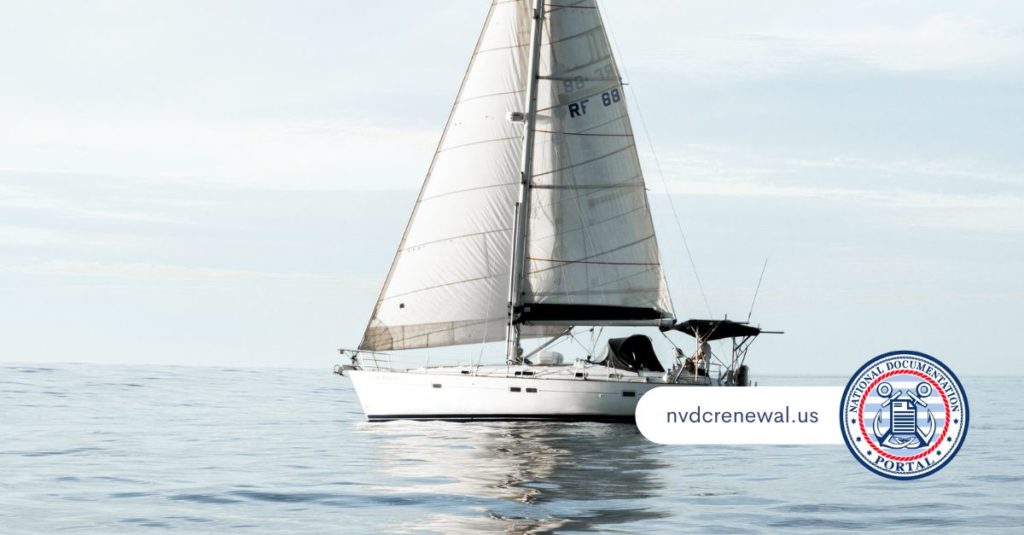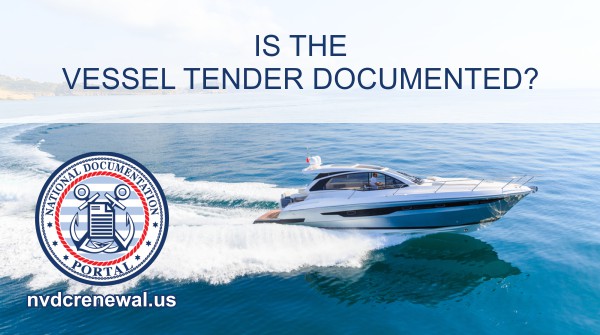No. Documentation of a primary vessel does not cover its tender or dinghy. Smaller craft do not meet the minimum size and volume requirements established by federal law for eligibility to be documented vessels.

For this reason, tenders and dinghies are regulated under state motorboat numbering laws rather than by the U.S. Coast Guard. If you are unsure about how to register or number your tender, you should contact the agency in your state responsible for motorboat registration.
For example: a common scenario is a recreational boater who purchases a new yacht along with a small inflatable tender. They document the vessel through our site but must handle the tender separately under their state’s numbering system. We guide customers through these distinctions so that everything stays compliant.
Our service makes it simple to understand these rules and to complete the correct filings for your main boat so you do not run into unnecessary compliance issues.
Vessel Documentation Size Requirements
To be eligible for federal documentation, an American vessel must measure at least five net tons. This is a measure of internal volume, not weight. In most cases, a vessel that is 25 feet or longer almost always qualifies. Tenders and dinghies, by contrast, are generally far smaller and therefore do not meet the five-net-ton threshold.
Our platform streamlines the process for owners of qualifying boats so they can complete their documentation filings quickly and accurately.
By helping you determine whether your vessel meets these requirements, we remove guesswork from the process.
Why Tenders Fall Under State Jurisdiction
Because tenders, dinghies, and other small craft fall below the five-net-ton threshold, they are governed by the motorboat numbering laws of the state in which they are principally used. This means that your tender will usually need to be registered or numbered with your state boating authority.
We cannot handle that process for you, but we can clarify which parts of your boating operation fall under federal versus state control so you don’t waste time or fees filing with the wrong agency.
Imagine a sportfisherman who keeps his 30-foot vessel at a marina in California and uses a small rigid tender to shuttle gear. Through our site he can complete his federal documentation for the larger boat, but he will be directed to California’s state boating office to handle the tender. This prevents delays, avoids fines, and keeps both craft properly recognized under the correct legal framework.
How Our Service Supports Documentation Needs
We focus on simplifying and accelerating the federal documentation process for your primary vessel. Our site allows you to apply for initial documentation, complete a documented vessel renewal, and make other filings without needing to mail paper forms or wait for extended processing times. This support ensures that your main vessel remains in good standing with the Coast Guard and compliant with all applicable laws.
We also provide clear explanations of common questions like whether a tender can be documented. By understanding the limits of federal documentation, you can plan ahead for your boating season.

Federal Laws and Eligibility Criteria
The rules governing eligibility for federal documentation are set out in 46 CFR Part 67, available at this link. These regulations specify which vessels can receive a Certificate of Documentation and which cannot. They make clear that a vessel must be at least five net tons and wholly owned by a U.S. citizen to qualify.
They also outline the different types of endorsements available depending on a vessel’s use. Our service helps you understand these rules as you complete your filings.
This is particularly helpful for owners of larger boats who might also have a smaller tender. By knowing exactly what the law allows, you can file correctly the first time. This reduces paperwork errors and ensures compliance with federal and state authorities.
Practical Scenarios for Boat Owners
We often see boaters who are new to federal documentation and assume their tender will automatically be covered. In practice, the tender must be treated separately. We clarify this distinction at the outset so you can plan your licensing, numbering, and fees accordingly.
Another common scenario is an owner upgrading from a state-registered boat to a yacht that qualifies for federal documentation. Through our service, they can seamlessly apply for the Certificate of Documentation for the new yacht, while keeping their existing small craft properly registered with their state. This smooth transition saves time and frustration.
Renewing and Maintaining Compliance
Once your vessel is documented, it is important to keep that status current. Our site allows you to complete a documented vessel renewal easily and securely. While this does not extend to your tender, it ensures that your primary vessel remains compliant at the federal level year after year. This ongoing support reduces the risk of lapses or penalties for expired documentation.
For instance, a commercial operator with a documented 45-foot workboat can handle their annual renewal online with us while maintaining state registration for their 10-foot tender. This dual approach keeps both vessels properly recognized and avoids regulatory issues.
Searching for Documentation Status
If you are unsure whether a vessel is documented, our platform offers a vessel documentation search feature that can help confirm the status of qualifying boats. This tool does not apply to tenders because they are not federally documented, but it is valuable for checking the records of larger craft. By using this resource, you can quickly verify the standing of your primary vessel and ensure that all paperwork is in order.
This is especially useful when purchasing a used boat. A buyer might find a yacht advertised as documented but will still need to confirm that status. Our site makes that easy, while also clarifying that any accompanying tender remains subject to state registration.
A Portal to Help With Documented Vessels and More
Understanding the limits of federal documentation is essential for boat owners who use multiple craft. Your main vessel may qualify for and receive federal documentation through our platform. But, your tender or dinghy remains under state jurisdiction. By handling each category correctly, you protect yourself from regulatory problems and keep your time on the water hassle-free.
Our service is built to simplify the federal side of this process. Whether you are applying for initial documentation, renewing, or simply want more info, we can help. Here, we take the complexity out of federal vessel documentation so you can focus on boating. Check out our portal today.

